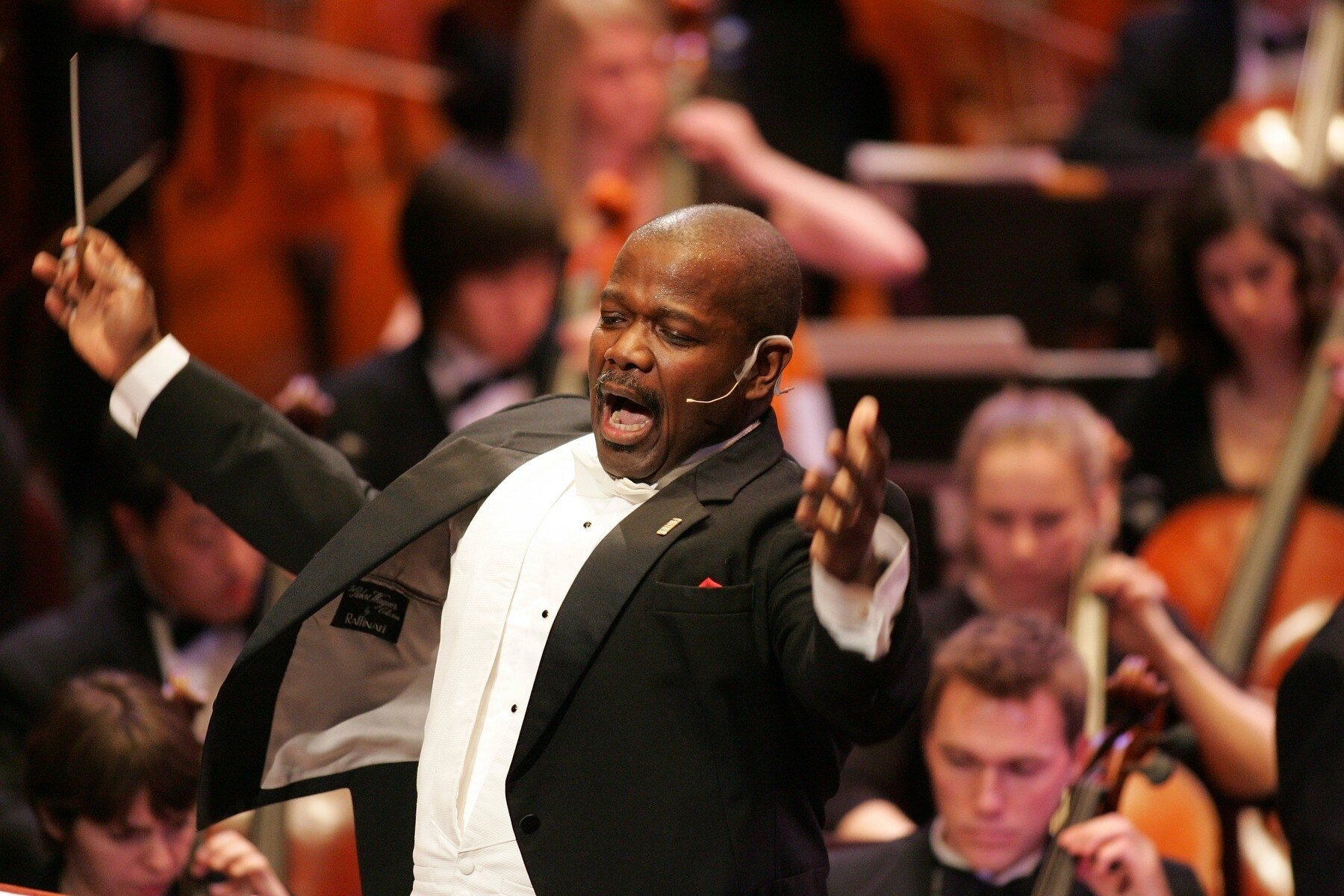EVERETT MCCORVEY INTEGRATES OPERA AND COMMUNITY IN THE COMMONWEALTH
It had been a whirlwind couple of years. After choosing to move to New York straight out of college at the University of Alabama, Everett McCorvey landed the opportunity of a lifetime: the chance to perform in the 1983 production of George Gershwin’s “Porgy and Bess.” He nailed the audition, excelled in his role and traveled the world with the revival, culminating in a performance at the Metropolitan Opera’s Debut Production in 1985.
But in that same year and after his immediate success in the field, McCorvey found himself at a crossroads. How would he move forward in his career? Could he make life as a performer in New York work? What’s next?
To answer these questions, he looked inward. In a 2015 interview with Creative Lexington, he elaborated on his response: “I wrote down every talent that I thought I had, every gift that I thought I had, and armed with that list, I went back to New York. And every Monday, my task was to take that list out, and make some sort of connection based on that list.”
Equipped with this focus and determination, he has since managed to reach the apex of two fields in tandem: music performance and teaching. As Professor of Voice and Director of Opera at the University of Kentucky, Everett McCorvey has toured the world and received critical accolades as a leading tenor soloist.
Who Is Everett McCorvey?
Born in Montgomery, Alabama in the peak of the Civil Rights movement, McCorvey’s immediate community was the locus for progressive activism throughout the 1960s. His father served as a deacon at the church where noted Civil Rights leader Ralph Abernathy acted as minister, and he grew up within three city blocks from where Martin Luther King, Jr. lived. His close proximity to the leaders and activists responsible for the movement would shape his moral compass.
From an early age, he was drawn to making music, and by third grade, he started learning the trumpet. Continuing in this direction through high school, he eventually migrated to the baritone horn, the instrument he would focus on throughout high school and college. After graduating from the University of Alabama with both a bachelor’s in music, he decided to audition to play the baritone horn for Bill Stevens, the celebrated voice teacher for celebrities like Jim Nabors. According to McCorvey, it was Stevens who recommended that he drop his focus on the baritone horn and instead invest in his singing.
Courtesy of Everett McCorvey
With this new enthusiasm for a different musical expression, McCorvey trained as a tenor and completed his Master’s degree from the University of Alabama. From his decision to leave the South for New York to pursue success on the stage, he would “perform all over the world, in such venues as the Kennedy Center, the Metropolitan Opera, Radio City Music Hall, and Queen Elizabeth Hall in London, England.”
Success as a Performer into Success as a Professor
After his impressive run in “Porgy and Bess” in the mid-1980s, McCorvey would step into roles on the stage as diverse as the roles he would take behind the scenes. At the same time that he would perform as “Don Jose in Carmen, Ferrando in Cosi Fan Tutte, Don Ottavio in Don Giovanni, Fenton in Falstaff, Eisenstein in Die Fledermaus, Puck in La Grande Duchess de Gerolstein,” he would also act as “musical director, voice teacher, producer, impresario, conductor, union representative, administrator and mentor.”
Building off his momentum from performing across the world and generating international press, McCorvey decided his passion was nested in a different but connected direction: teaching. After he married his wife Alicia Helm, the noted soprano, he decided to get his Ph.D. and turn to the world of academia.
With this inspiration to teach, he returned to the University of Alabama and finished his Ph.D. in music administration. Since 1991, he’s been on the University of Kentucky’s faculty in their school of music as a professor of voice. He entered the program as it began a “building phase,” one that wanted to attract some of the best talent in the country.
McCorvey knew up front what was expected of him: “If you want the best singers in the country, you have to have a great opera program,” he said in a recent interview. Because of his direction and his unrelenting determination as head of the University of Kentucky Opera Theater since 1997, the program has now become one of the most prestigious in the country. The operas that the school performs, he believes, are several notches above typical productions put on by colleges and universities. “The programs that we present are not your everyday college-level opera programs -- I would put these on par with major regional opera companies.”
While building UK’s opera program, McCorvey also founded the American Spiritual Ensemble. He created the group in 1995 to preserve “the music of the American negro slaves” and “to keep the American negro spiritual alive.”
Even during his work to establish the University of Kentucky’s opera program and the American Spiritual Ensemble, McCorvey has still managed to direct and perform. His music and direction has appeared in several PBS documentaries, including A Tribute and a Toast to Opera, The Spirituals, The American Spiritual Ensemble in Concert, and It’s a Grand Night for Singing 25th Anniversary.
Courtesy of Jonathan Palmer
While he has received accolades and awards throughout his career as a performer and a teacher, most recently he won the SEC Faculty Achievement Award in April 2020. Commenting on the immense importance of McCorvey’s presence, the Provost at the University of Kentucky David Blackwell pointed out that McCorvey “brought our campus a deep and revitalized sense of culture, as well as a broader understanding of the field of music and how it contributes to a healthier, more constructive society.”
Because of his impact on the music program’s architecture, he now believes Kentucky has developed a new reputation built on “bourbon, horses and opera.”
Advocacy for Progress
McCorvey’s passion for community extends beyond his excellence in music. Because of his roots in activism, coming from Montgomery during the height of the Civil Rights movement in the 1960s, McCorvey has noticed several correlations between that period and the moment after the police killings of George Floyd and Breonna Taylor in the Spring of 2020.
The moment caused him to reflect on and communicate his own experience as a Black man. He recently stated in an interview, “I was a child in the ‘60s when Montgomery was going through all the difficulties of the Civil Rights movement. So much of [the demonstrations] reminds me of the Civil Rights movement. Throughout my life, these were the experiences that I had, so I knew that I had to be twice-as, twice-as, twice-as to be accepted.”
In this capacity, he expanded that “people who are not of color don’t even realize that there’s racism going on.” The moment introduced a new mode of thinking, not only for him but on a major scale: “What this movement did is for the first time unveil all of the challenges that people of color have to go through just to survive.”
What he found most inspiring from these demonstrations in his local community and across the country was the enthusiasm generated by young people, by his students:
“I’ve been following a lot of my students. Many of them are protesting in their homes, their cities... These people are later on going to be our politicians, our heads of corporations, our leaders in charge. They’re going to be making decisions. Because of their experience during this time, their decisions will be made that are more just, more equal, and they will remember this time that they protested for equal rights.”
Even from a young age, he knew what would be expected of him: “As I was going through junior high school, I said they may not like me because I’m black. They may not like me because I’m overweight. But I will work hard in my talents so that they at least respect me. Because I thought perhaps [that] could be my talent that could be my way out of the difficulty that was brought on by intolerance and segregation that was happening in the South.”
To celebrate Black History Month, check out Kentucky to the World’s most recent program:The War on Terror to the War on Truth: Pulitzer-Winning Journalist Dana Canedy. A University of Kentucky graduate and Pulitzer Prize winner, Dana Canedy talks with former Courier Journal editor Rick Green on the state of the media, consequences of and solutions to systemic racism and the future of journalism.




